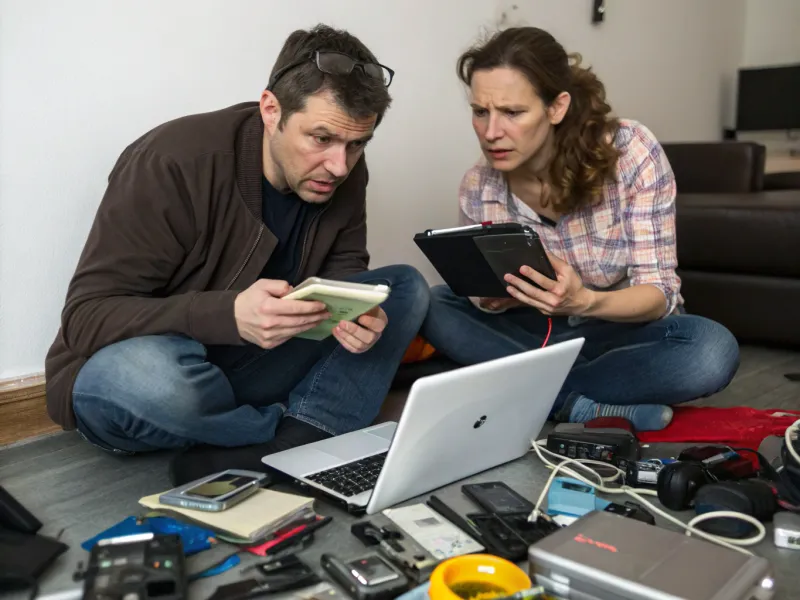29 Things Men Shouldn’t Be Expected To Do For Their Wives
Let’s face it, society often heaps a ton of expectations on relationships, and sometimes, men feel like they’re supposed to jump through hoops to keep their partners happy.
But let’s clear the air a bit—there are things that men shouldn’t feel obligated to do for their wives. It’s time to recognize that a relationship is a partnership, where both parties contribute and support each other as equals.
So, here’s a look at 29 things men can stop sweating about. Remember, it’s all about balance, communication, and mutual respect!
1. Pianificate ogni serata di coppia

Date nights are essential to keeping romance alive, but planning them shouldn’t fall on one person. Guys, it’s okay if you’re not the romantic planner every single time. A successful date is about the shared experience, not just the orchestrated details. Both partners should feel free to come up with ideas, whether it’s a fancy dinner or a simple night in with takeout and movies.
Condividere la pianificazione può portare a scoprire insieme nuove attività. Inoltre, permette a entrambi i partner di sentirsi valorizzati e apprezzati. Quando la pianificazione di un appuntamento diventa un compito condiviso, può portare a esperienze più significative e a meno stress. Nessuno deve assumersi la responsabilità da solo. Alternando o collaborando alle idee per gli appuntamenti, si garantisce una gamma diversificata di esperienze e si mantiene viva l'eccitazione.
If you’re not naturally inclined to plan, communicate openly about your preferences and listen to your partner’s suggestions too. Enjoying time together is what truly counts, not who planned it. So, release the pressure of being the sole planner, and embrace the fun of joint creativity in your relationship.
Vedi anche: 27 cose che le donne non dovrebbero essere costrette a fare nel matrimonio
2. Prendere tutte le decisioni finanziarie

Finances can be a tricky topic, but they shouldn’t rest solely on one partner’s shoulders. It’s crucial to approach financial planning as a team effort. Communication is the cornerstone of a healthy financial relationship. Men don’t need to feel obligated to make all the financial decisions. Instead, both partners can contribute to budgeting, saving, and investing.
By doing so, it ensures transparency and mutual understanding. It’s essential to discuss financial goals regularly and adjust plans as needed. Sharing the responsibility helps each partner feel informed and involved. It also reduces stress and prevents misunderstandings. With shared insights, you can make smarter decisions that benefit both parties. Remember, financial decisions impact both partners, so involving each other makes sense.
Discutere apertamente di denaro può anche aumentare la fiducia e la cooperazione. If you’re not naturally confident with finances, it’s okay to seek advice together. Working as a team strengthens your bond and ensures financial stability. Don’t feel pressured to handle it all alone; instead, embrace the strength of a collaborative approach to financial health.
3. Essere l'unico a portare il pane

Gone are the days when men were expected to be the sole breadwinners. Today, relationships thrive on partnership and shared responsibilities. It’s important to recognize that financial contributions can come from both partners. Men shouldn’t feel pressured to be the only providers.
Le dinamiche delle relazioni moderne consentono di contribuire in modi diversi, sia finanziariamente che attraverso altri ruoli di supporto. Condividendo il carico finanziario, entrambi i partner possono perseguire le proprie passioni e ambizioni. Questo non solo allevia lo stress, ma favorisce anche l'uguaglianza e il sostegno reciproco. Discutere apertamente degli obiettivi di carriera e delle aspettative finanziarie può portare a una relazione più comprensiva ed equilibrata. Questo approccio consente a ciascun partner di crescere individualmente, sostenendosi a vicenda.
It’s okay to redefine traditional roles and prioritize what works best for your unique situation. Embracing shared financial responsibility encourages personal growth and strengthens your relationship. Remember, it’s not about who earns more or less; it’s about building a life together, appreciating each other’s contributions, and nurturing a partnership that aligns with your values and goals.
4. Gestire tutto il supporto emotivo

Emotional support is vital in any relationship, but it shouldn’t be a one-way street. Gli uomini spesso sentono il bisogno di essere il costante pilastro della forza, but it’s perfectly okay to lean on each other. Both partners should feel comfortable sharing their emotions and supporting one another. Being open about feelings fosters a deeper connection and understanding. It’s important to create an environment where both partners can express themselves freely without fear of judgment.
Encouraging open communication allows for shared emotional support and growth. This dynamic helps build a strong foundation of trust and empathy. By sharing the responsibility of emotional support, you create a balanced relationship where both partners feel heard and valued. Remember, it’s okay to ask for help and provide support in return.
Una relazione sana prospera grazie alla cura e alla comprensione reciproca. Lasciate andare la pressione di essere l'unica roccia emotiva e abbracciate la forza di una partnership in cui entrambi gli individui possono appoggiarsi l'uno all'altro. Il sostegno emotivo è un viaggio condiviso che rafforza il vostro legame e vi avvicina.
5. Organizzare ogni riunione di famiglia

Family gatherings are wonderful opportunities to connect, but organizing them shouldn’t be one person’s responsibility. Men shouldn’t feel obligated to take the reins every time. Planning family events should be a collaborative effort, allowing everyone involved to contribute ideas and share the workload. By involving both partners, you can create gatherings that reflect everyone’s preferences and interests
Inoltre, riduce lo stress e la pressione su un singolo individuo. Una comunicazione aperta sulle aspettative e sulle preferenze può portare a eventi familiari più piacevoli e memorabili. Questo approccio condiviso garantisce che entrambi i partner si sentano inclusi e apprezzati. Quando tutti si impegnano, si crea un senso di coesione e si rafforzano i legami familiari.
Remember, it’s about creating joyful moments with loved ones, not about who planned the event. So, let go of the pressure to be the sole organizer and enjoy the process of planning together. Family gatherings are meant to be cherished, and by working as a team, you can create lasting memories that everyone will treasure.
6. Gestire tutte le finanze

Financial management isn’t a solo journey in a marriage. Men shouldn’t feel burdened with the task of handling all financial matters. By working together, both partners can gain a clearer understanding of their financial situation and make informed decisions that benefit the household.
Una comunicazione aperta su denaro, budget e obiettivi finanziari crea trasparenza e fiducia. Le coppie possono stabilire un sistema di distribuzione delle responsabilità finanziarie, assicurando che ogni partner si senta coinvolto e rispettato nel processo di pianificazione finanziaria.
7. Iniziare ogni momento intimo

Intimacy is a beautiful part of relationships, but initiating those moments shouldn’t solely rest on one partner. Gli uomini potrebbero sentirsi obbligati a fare sempre la prima mossa, but it’s important to recognize that both partners can take the lead. Sharing this responsibility allows for a more balanced and fulfilling intimate connection.
When both partners feel comfortable expressing their desires, it creates an environment of trust and openness. It’s okay if you’re not always the one to initiate. Encouraging your partner to express their needs helps deepen your bond. The spontaneity of alternating who takes the lead can also bring excitement and variety to your relationship. Remember, intimacy is about connection and closeness, not just physical acts.
By embracing a shared approach, you foster a sense of equality and mutual respect. Let go of the idea that you have to be the only initiator, and enjoy the journey of exploring intimacy together. Building a loving and supportive relationship means valuing each other’s contributions and desires, creating a space where both partners feel cherished and loved.
8. Essere l'unico tecnico che risolve i problemi

Technology can be both a blessing and a curse, especially when something goes wrong. Men often find themselves in the role of the designated tech troubleshooter, but it doesn’t have to be that way. It’s perfectly fine to share this responsibility. Both partners can contribute to solving tech issues, whether it’s resetting the Wi-Fi or troubleshooting a gadget.
By collaborating, you can tackle tech challenges together, which can be both fun and educational. If you’re not a tech wizard, don’t worry—there are countless resources and guides available. Encouraging each other to learn and troubleshoot together not only reduces stress but also builds confidence in handling technology. Remember, it’s not about who fixes it but about working together to find a solution. Sharing the role of tech support can also prevent burnout and frustration.
Quindi, lasciate perdere la pressione di essere l'unico esperto di tecnologia e cogliete l'opportunità di imparare insieme. Questo approccio favorisce il lavoro di squadra e rafforza il vostro rapporto, mentre navigate nel mondo digitale mano nella mano.
9. Gestire tutti i progetti domestici fai-da-te

Home projects can be a great way to bond, but the idea that men should tackle all DIY tasks is a bit outdated. It’s perfectly okay to share these responsibilities. Both partners can contribute to planning, executing, and enjoying the fruits of their labor. Collaborating on DIY projects allows for creativity and shared success. It’s important to communicate about each person’s skills and preferences, ensuring a balanced approach.
Sharing the workload not only makes the project more enjoyable but also prevents burnout. Remember, it’s not about who wields the hammer, but about working together to create something beautiful. By involving each other, you can learn new skills and strengthen your partnership. If you’re not naturally handy, don’t shy away from asking for help or learning new techniques.
Abbracciate l'opportunità di creare e innovare come una squadra. Questo approccio condiviso ai progetti domestici favorisce un senso di realizzazione e di unione, rendendo la vostra casa un vero e proprio riflesso dei vostri sforzi e della vostra creatività.
10. Be the Point Person for Kids’ Activities

Kids’ activities can be a whirlwind of schedules and commitments, but managing them shouldn’t rest solely on one parent. Men often find themselves as the go-to person for coordinating sports, lessons, and playdates, but it’s okay to share this role. Both parents should feel equally involved in their children’s lives.
Collaborating on scheduling and attending activities ensures that both partners are present and engaged. It’s important to communicate openly about each parent’s availability and interests, fostering a balanced approach. Sharing the responsibility of managing kids’ activities not only lightens the load but also strengthens the family bond. Remember, it’s about being there for your kids, not about who handles the logistics.
Lavorando insieme, si crea un ambiente di sostegno in cui i figli si sentono amati e apprezzati. Abbandonate la pressione di essere l'unico coordinatore e godetevi il viaggio della genitorialità come una squadra. Questo approccio consente a entrambi i genitori di custodire momenti preziosi e di creare ricordi duraturi con i propri figli.
11. Pianificare tutti i viaggi

Traveling is an exciting adventure, but planning every detail shouldn’t be one person’s burden. Men shouldn’t feel obliged to organize the entire trip. Instead, both partners can contribute to planning and decision-making. By sharing the responsibility, you can create travel experiences that reflect both partners’ interests and preferences.
Collaborating on travel plans allows for a more balanced and enjoyable journey. Discussing destinations, activities, and accommodations together ensures that both partners are equally invested. Sharing the planning process can also lead to discovering new interests and passions. Remember, it’s about experiencing the journey together, not about who booked the flights.
Lavorando in squadra, potete rendere l'organizzazione del viaggio una parte divertente ed emozionante dell'avventura. Lasciatevi andare alla pressione di dover gestire tutto e abbracciate la gioia di esplorare nuovi luoghi insieme. Questo approccio favorisce un senso di unità e cooperazione, rendendo i vostri viaggi più memorabili e soddisfacenti.
12. Essere l'unico cuoco

Cucinare può essere un'esperienza piacevole, ma l'idea che gli uomini debbano essere gli unici chef è un po' eccessiva. Condividere i compiti culinari permette a entrambi i partner di godersi il processo e di legare con i pasti. Men shouldn’t feel obligated to cook all the time. Instead, both partners can take turns or cook together, creating a more balanced approach to meal preparation. Collaborating in the kitchen can lead to discovering new recipes and techniques.
It’s important to communicate about each person’s comfort level and preferences, ensuring an enjoyable cooking experience. Sharing the responsibility of cooking not only lightens the load but also fosters creativity and teamwork. Remember, it’s not about who cooks better; it’s about enjoying delicious meals together.
Lavorando insieme, potete rendere la cucina una parte divertente e significativa della vostra relazione. Abbandonate la pressione di essere l'unico chef e abbracciate la gioia dell'esplorazione culinaria come una squadra. Questo approccio rafforza il vostro legame e aggiunge sapore alla vostra relazione, creando ricordi duraturi con i pasti condivisi.
13. Decorare tutta la casa

Decorating a home can be a fun and rewarding experience, but the idea that men should handle all of it is outdated. It’s okay to share the responsibility of creating a cozy and stylish living space. Both partners can contribute to choosing decor elements that reflect their tastes and personalities.
It’s important to communicate about each person’s preferences and ideas, ensuring a harmonious design. Sharing the responsibility of decorating not only makes the process more enjoyable but also fosters a sense of unity. Remember, it’s not about who has the best eye for design; it’s about creating a space that feels like home for both partners. By working together, you can make decorating a collaborative and fulfilling experience.
Abbandonate la pressione di dover gestire tutto da soli e abbracciate la gioia di trasformare il vostro spazio abitativo come una squadra. Questo approccio rafforza la vostra collaborazione e dà come risultato una casa che riflette davvero i vostri sforzi e la vostra creatività.
14. Gestire tutti gli appuntamenti medici

Medical appointments are a vital aspect of self-care, but managing them shouldn’t fall solely on one partner. Men often find themselves responsible for scheduling and coordinating, but it’s perfectly okay to share this responsibility. Entrambi i partner devono sentirsi ugualmente coinvolti nel mantenimento della propria salute.
Sharing the responsibility of managing appointments not only lightens the load but also strengthens your commitment to each other’s well-being. Remember, it’s about supporting each other’s health, not about who makes the calls.
Lavorando insieme, si crea un ambiente di sostegno in cui entrambi i partner si sentono apprezzati. Questo approccio rafforza il vostro legame e garantisce che entrambi i partner ricevano le cure e le attenzioni che meritano.
15. Assumere la guida nella risoluzione dei conflitti

Conflicts are a natural part of any relationship, but resolving them shouldn’t rest solely on one partner. Men often find themselves taking the lead in mending disputes, but it’s important to recognize that both partners can contribute to finding solutions. Sharing the responsibility of conflict resolution fosters a balanced and respectful relationship.
It’s important to communicate openly and honestly, allowing both partners to express their feelings and perspectives. By working together, you can find common ground and strengthen your bond. Remember, it’s not about who resolves the conflict, it’s about working as a team to create understanding and harmony.
16. Essere l'unico a chiedere scusa

Apologies are an essential part of healing and growth, but they shouldn’t be one-sided. Men often feel pressured to apologize first or take the blame, but in a healthy relationship, entrambi i partner devono sentirsi a proprio agio nell'ammettere gli errori. Sharing the responsibility of apologizing fosters mutual respect and understanding. It’s important to communicate openly and approach conflicts with empathy.
By encouraging each other to take accountability, you create a balanced and supportive bond. Remember, it’s not about who apologizes first; it’s about acknowledging feelings and making amends. Let go of the pressure to be the sole apologizer, and embrace the opportunity to grow together.
This approach enhances your connection and ensures that both partners feel heard and valued. By sharing the responsibility of apologizing, you create a partnership based on trust and cooperation. It’s okay to admit when you’re wrong and take steps to make things right. This fosters a relationship where both partners feel cherished and supported.
17. Essere la persona di riferimento per tutte le riparazioni

Home repairs are a part of life, but the idea that men should handle all of them is unrealistic. It’s perfectly okay to share these responsibilities. Both partners can contribute to managing repairs, whether big or small. Collaborating on repairs allows for a more balanced and stress-free approach. It’s important to communicate about each person’s skills and preferences, assicurando un risultato di successo
Sharing the responsibility for repairs not only makes the process more enjoyable but also fosters teamwork. Remember, it’s not about who fixes it; it’s about working together to maintain a comfortable home. By involving each other, you can learn new skills and build confidence. Let go of the pressure to be the sole fixer, and embrace the opportunity to work as a team.
Questo approccio rafforza la vostra partnership e garantisce una buona manutenzione della casa. Condividendo la responsabilità delle riparazioni, si crea un ambiente di vita solidale ed efficiente, in cui entrambi i partner si sentono apprezzati e stimati.
18. Avviare tutti i piani sociali

Social engagements can be a source of joy, but they shouldn’t rest solely on one partner’s shoulders. Men don’t have to feel obligated to organize every social meeting or event. Sharing the responsibility of planning social activities ensures that both partners are involved and enjoy the interactions.
It can be refreshing for both to take turns in making plans or suggesting outings. This approach allows for a more balanced social calendar that caters to both parties’ interests, providing a shared sense of excitement and anticipation about upcoming events.
19. Essere sempre il conducente

Sharing the responsibility of driving can enhance a couple’s travel experiences. Men shouldn’t feel obligated to always take the wheel. Women can drive just as competently.
Questa pratica consente a entrambi i partner di godersi il viaggio e di fare a turno per rilassarsi o navigare. Incoraggia la comunicazione e le decisioni reciproche durante il viaggio.
Ricordate che la guida è un'abilità, non un dovere assegnato dal genere. Accogliete l'opportunità di condividere questo compito e godetevi il viaggio insieme.
20. Gestire tutte le faccende domestiche

Household chores are a shared responsibility, not a solo endeavor. The idea that men must bear the brunt of keeping the house tidy is outdated. It’s time we reframe this notion. Tutti i membri della famiglia, indipendentemente dal sesso, dovrebbero contribuire alla manutenzione dello spazio.
Sure, some people might enjoy certain tasks more than others, but that doesn’t mean anyone should feel it’s solely their duty. Communication and delegation are key here. Discussing each person’s strengths and preferences can lead to a harmonious home environment without the pressure on one individual. Remember, it’s about working together as a team. Sharing chores not only makes the workload lighter but also strengthens the partnership.
When both partners pitch in, it creates a sense of unity and cooperation that benefits everyone. So, guys, if you don’t enjoy dusting or folding laundry, talk it out and find a balance that works for both of you. It’s perfectly okay not to tackle everything on your own.
21. Ricordare ogni data importante

Anniversaries, birthdays, and special occasions are meaningful, but men shouldn’t feel obligated to be the sole memory bank for them. Relationships thrive on mutual effort, and both partners can take responsibility for remembering and celebrating important dates. Forgetting a date now and then doesn’t mean someone doesn’t care—it just means life can get busy.
Invece di far ricadere tutta la pressione su una sola persona, utilizzate calendari e promemoria condivisi, o addirittura discutete insieme delle celebrazioni in anticipo. Questo non solo garantisce il coinvolgimento di entrambi i partner, ma rende la pianificazione più divertente e meno stressante. In fin dei conti, ciò che conta è l'amore e il pensiero che sta dietro alla celebrazione, non solo chi viene ricordato per primo.
22. Essere l'unico risolutore di problemi

Ogni relazione deve affrontare delle sfide, ma solving them shouldn’t rest on one person’s shoulders. Men often feel the pressure to fix everything, whether it’s logistical issues, emotional concerns, or family dilemmas. But a healthy relationship is about teamwork—both partners should be equally engaged in finding solutions.
Instead of expecting one person to always have the answers, approach problems together. Open conversations, brainstorming solutions, and supporting each other through difficulties strengthen the partnership. Sharing the responsibility of problem-solving fosters respect and collaboration, ensuring that neither partner feels overwhelmed or alone in handling life’s challenges.
23. Prendere sempre l'iniziativa nel processo decisionale

Making decisions is an integral part of any relationship, but men shouldn’t feel obligated to be the default decision-makers. Whether it’s choosing what to have for dinner, making big life choices, or handling daily logistics, both partners should have an equal say. A balanced relationship thrives on collaboration, where decisions are made together based on mutual understanding and respect.
It’s okay to step back and allow your partner to take the lead sometimes. Sharing this responsibility can strengthen trust and encourage a more harmonious dynamic. Open communication and teamwork ensure that both voices are heard and valued. Instead of shouldering the burden alone, embrace decision-making as a joint effort, making choices that reflect both of your needs and aspirations.
24. Siate voi a dare il via a conversazioni profonde

Meaningful conversations are the foundation of emotional intimacy, but men shouldn’t feel pressured to always be the ones to start them. Emotional depth and vulnerability should be encouraged on both sides, creating a safe space where both partners feel comfortable opening up. Le relazioni fioriscono quando la comunicazione è reciproca e non unilaterale.
If you’re not always the first to bring up deeper topics, that’s okay. Your partner should also take the initiative in fostering open discussions about feelings, future plans, or concerns. A relationship is strongest when both individuals invest in heartfelt communication, rather than placing the responsibility on just one person. Let go of the expectation that you always have to lead—true connection comes from shared effort.
25. Seguire ogni dettaglio della casa

Tenere traccia delle incombenze domestiche, delle bollette e della manutenzione può sembrare un lavoro senza fine, ma men shouldn’t feel obligated to manage everything. La gestione di una casa è un lavoro di squadra ed entrambi i partner dovrebbero contribuire a mantenere le cose organizzate. Dalla spesa alla riparazione del rubinetto che perde, fino al pagamento della bolletta della luce, nessuno deve essere lasciato solo.
By sharing these responsibilities, both partners feel equally invested in maintaining a smooth household. Communicating openly about chores and expectations ensures that no one feels overwhelmed. Instead of feeling like you have to remember every little detail, establish a system that works for both of you—whether it’s a shared calendar, weekly check-ins, or dividing tasks based on strengths and preferences. A balanced home is built on teamwork, not obligation.
26. Carry All the Emotional Baggage
Picture this: a husband, while sipping his morning coffee, becomes the sole go-to for every emotional storm in the household. It sounds overwhelming, right? It’s essential for both partners to share emotional burdens equally. While men can be empathetic listeners, they shouldn’t feel obligated to absorb every emotional wave alone.
In healthy relationships, emotional responsibilities should be shared. Encouraging open dialogues with friends or seeking professional therapy can provide diverse perspectives. This not only strengthens the bond but also ensures emotional well-being for both partners. Embracing external support fosters mutual growth and understanding.
27. Handle All Last-Minute Errands
Imagine a young man, dashing through a bustling supermarket aisle, juggling groceries, cleaning supplies, and a phone call from home. It’s a scene many can relate to, yet it’s an unfair expectation to place solely on one partner. Sharing last-minute errands can alleviate stress and build cooperation.
Instead of one person bearing the brunt, splitting responsibilities allows both partners to manage their time effectively. Moreover, running errands together can be a bonding experience, even turning mundane tasks into enjoyable moments. This shared approach nurtures a balanced and harmonious household dynamic.
28. Be the Default Event Planner
Picture a man juggling dates, RSVPs, and venue bookings while trying to balance his work and personal life. Expecting him to be the default event planner can be overwhelming. Relationships thrive on shared responsibilities, and planning events should be no different.
By collaborating on these tasks, both partners can contribute ideas and ensure enjoyment for everyone involved. It’s vital to remember that partnership means sharing the workload. After all, a successful event is often the result of combined efforts, where each person’s input adds a unique touch, creating a memorable experience for all.
29. Remember Every Important Date
It’s a common trope that men forget anniversaries or birthdays, but the pressure to remember every significant date can be stressful. Expectations should be realistic, allowing room for human error. A gentle reminder or shared calendar can alleviate this pressure, ensuring no special moment is overlooked.
This approach fosters a collaborative environment where both partners feel valued. Sharing the responsibility of remembering dates strengthens the bond, as it becomes a joint effort to celebrate and cherish important milestones.
Vedi anche: 23 cose che le donne non dovrebbero sentirsi obbligate a fare per i loro mariti











